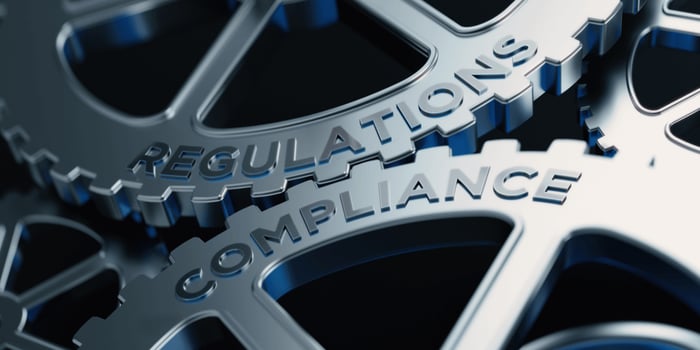Five insights learned after 10 years in the business of compliance
Over the past decade, regulatory compliance has significantly evolved due to emerging technologies, shifting geopolitical dynamics, and changing enforcement priorities. Businesses adapting to complex regulations can benefit from insights from ten years of experience mitigating risks and effectively adapting strategies.
In this blog post, to celebrate Trans World Compliance's 10th anniversary, we delve into the valuable lessons learned after a decade in the compliance business. Drawing from testimonies provided by industry experts Dave Olenzak and Dan Peak, we explore key themes ranging from the slow adoption of regulations like CRS and FATCA to evolving enforcement environments and market dynamics.

Testimonials from experts
Dave Olenzak, Founder of TWC, and Dan Peak, Chairman at TWC, are two individuals deeply entrenched in the world of compliance. Their insights provide valuable firsthand experiences and observations on the challenges and opportunities encountered over the past decade.
Dave Olenzak's Perspective
When I started TWC, I thought the adoption curve might be slower than AML but still much faster than it is. AML rules had been issued by FAFT in 1990, but it wasn't until 2001 and the 9/11 attacks on the World Trade Center that things went into overdrive. The USA Patriot Act was passed to provide teeth to AML regulations. There were competing claims of various watch list vendors claiming to have the perpetrators on their watch lists, and governments worldwide feared another attack. The intention was to disrupt the terrorists' funding to hinder their activities effectively.
I assumed that greed, not fear, would fuel CRS and FATCA compliance. The idea that a country could find millions/billions of additional revenues by cutting down on their tax cheats seemed to be pretty attractive. There would be the added benefit of governments being able to show they are holding the rich and powerful accountable to the same rules that everyone else must play by.
I wish I could paint a rosy picture of CRS and FATCA compliance, but I can't. There have been billion-dollar fines for AML violations (usually willful and systemic). There are inconsistencies in the regulation of CRS and FATCA, and it is challenging to identify significant penalties. No major actions from any government would cause a board of directors to sit up and start asking hard questions of the compliance departments. Companies are doing nothing or little regarding CRS and FATCA compliance. Some forward-thinking compliance departments are taking this seriously and doing the reporting correctly. However, in terms of tax authorities recouping missing tax revenue – I can't point to any. The summary by the Inspector General for the Department of the Treasury shows that after seven years of collecting data, the IRS spent half a billion dollars and recouped zero dollars in missing tax revenue.
Suppose you want to look at the benefits of this slow adoption curve. In that case, we are a small company with limited resources. Had there been a faster adoption curve and a larger market, larger companies would have jumped in with greater resources, and we may not have had time to build out our software and get the bugs out. For tax authorities, there are two competitors. There is little competition for comprehensive CRS and FATCA software for financial institutions. There are a few high-end systems and some low-end XML converters. I view the high-end systems as Rolls-Royces and our system as an everyday person's Ford. Should a tax authority start taking CRS and FATCA reporting seriously, we would be well-positioned to take advantage of the market.
Dan Peak's Perspective
Opinion: The enforcement environment is the big difference over the past ten years. While there have been notable strides in regulatory oversight, there remain critical areas where enforcement has evolved at a pace different from compliance measures.
Recent examples underscore the need for more robust penalties for violations. Consider the widely reported case of JPMorgan utilizing secure communications transmissions to circumvent regulatory oversight. Despite this clear violation, the resulting judgment and fine were deemed insignificant, raising questions about the deterrent effect of penalties.
Similarly, the recent judgment against a UK billionaire residing in the Bahamas for numerous insider trading violations highlights the inadequacy of enforcement measures in addressing complex financial crimes. The trivial nature of the fine imposed fails to reflect the gravity of the offenses committed, casting doubt on the ability of regulatory bodies to hold wrongdoers accountable.
However, the core issue extends beyond individual cases—it lies in the broader failure of US enforcement to combat tax avoidance with overseas investments. The IRS budget is treated as a political football, with insufficient investment and support to build a robust framework for detection and enforcement. Despite significant investments of time, effort, and taxpayer dollars, the returns on these investments have been minimal, if not negligible.
This is not a narrative of defeat but a call to action. The US must take a leadership role in setting an example for the rest of the world in regulatory enforcement. By strengthening enforcement mechanisms and fostering collaboration with other reporting countries, we can move closer to achieving tax fairness and accountability on a global scale.
In reflection, the past decade has revealed shortcomings in enforcement effectiveness, but it also presents an opportunity for meaningful change. Let us seize this opportunity to reinvigorate our commitment to regulatory compliance and enforcement, ensuring integrity and trust in our financial systems for generations to come.
The simple examples here can be debated, but more importantly, where is the headline news regarding enforcement? Our history over the last decade underscores a clear pattern of fewer enforcement cases over the last ten years.
These testimonials provide valuable insights into the realities of regulatory compliance, emphasizing the importance of being adaptable, innovative, and strategic in navigating the intricate regulatory landscape.

Five insights learned
As we explore the challenges and opportunities in compliance, it becomes evident that leveraging lessons learned from testimonies like Dave Olenzak's and Dan Peak's is essential for shaping effective compliance strategies in the years ahead. Here are five insights learned after ten years in the business of compliance:
1- Slow adoption curve and enforcement discrepancy: Despite the potential financial gains, adopting regulations like CRS and FATCA has been slower than anticipated. While AML regulations saw rapid implementation post-9/11 due to fear-driven urgency, the same level of enforcement and compliance has yet to materialize for tax-related regulations like CRS and FATCA.
2- Lack of stringent enforcement: While billion-dollar fines have been imposed for AML violations, CRS and FATCA compliance enforcement has been inconsistent and lacks teeth. Significant fines or government actions to enforce compliance are rare, leading to complacency among some companies regarding their compliance efforts.
3- Resource constraints and market positioning: For smaller companies like TWC, the slow adoption curve has provided an opportunity to develop compliance software without facing significant competition from larger firms. However, the lack of enforcement also means that potential market growth is contingent upon regulators taking CRS and FATCA reporting more seriously.
4- Evolution of enforcement environment: There has been a notable shift in the enforcement environment over the past decade, focusing on penalties for violations but insufficient emphasis on tax avoidance with overseas investments. The budgetary constraints and political dynamics surrounding the IRS have hindered effective enforcement efforts.
5- Call for action and leadership: Despite the challenges, there's a call to action for the US to take a leadership role in combatting tax avoidance and ensuring global tax fairness. There's a need for political will and investment in enforcement frameworks to drive compliance and set an example for other reporting countries.
Conclusion
In conclusion, the past decade has brought significant insights into regulatory compliance. From the slow adoption of regulations like CRS and FATCA to the evolution of enforcement environments and historical precedent, valuable lessons can be learned for businesses and regulatory bodies alike.
The testimonies of industry experts like Dave Olenzak and Dan Peak shed light on the challenges and opportunities inherent in compliance efforts. By reflecting on these insights and anticipating future regulatory trends, businesses can better position themselves to navigate the complexities of compliance and foster a culture of transparency and accountability.
As we progress, stakeholders across industries must proactively enhance their compliance practices. We encourage readers to reflect on their compliance practices and identify areas for improvement, considering the insights shared in this blog post.




